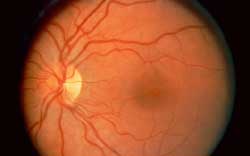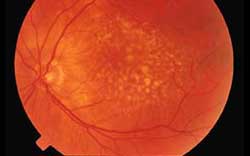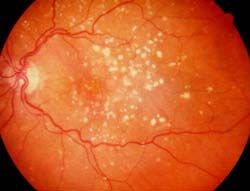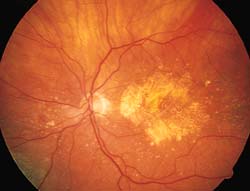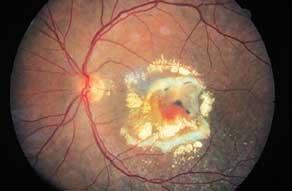
Macular Degeneration Evaluation and Treatment
What is macular degeneration?
The retina is the wall paper-like structure which lines the back of the eye. It is thin and smooth, and is responsible for turning light into vision. The center of the retina is called the macula. The macula is the area responsible for your sharp central vision. Macular degeneration is a disease in which the central retina (the macula) deteriorates, causing distortion and loss of central vision.
Normal eye. The round yellow structure is the end of the optic nerve as it exits the eye. The darker, smooth area next to it is a normal macula.
Early dry macular degeneration.
What are the different forms of macular degeneration?
Dry and Wet. The dry form occurs when the macula breaks down and deteriorates. Yellow clumps of waste tissue (called “drusen”) deposit and accumulate in the retina. The normally smooth pigment layer of the retina becomes irregular, and clumps of pigment deform the macula.
Dry macular degeneration.
End stage dry macular degeneration. The macula has completely deteriorated.
The wet form occurs when the macula breaks down and deteriorates, and abnormal blood vessels grow and bleed. These abnormal blood vessels cause tremendous scarring of the macula, and often lead to rapid and severe loss of vision.
Wet macular degeneration. There is blood in the center surrounded by scar tissue.
Who is at risk for macular degeneration?
Macular degeneration is a disease of older people, typically over 60 years old. There is no known cause but there seems to be a tendency for it to run in families. In most cases, people are born with a predisposition to develop the disease, and it appears later in life. Sunlight exposure and smoking may increase the risk to develop macular degeneration as well.
Is there treatment for or ways to prevent macular degeneration?
The Age-Related Eye Disease Study (AREDS) showed that some patients who took a combination of vitamins C, E, beta carotene, and zinc had a lower rate of visual loss from macular degeneration than some other patients who did not take the vitamins. Therefore, we recommend such vitamin therapy to patients with moderate macular degeneration. The effect of other supplements such as lutein and bilberry were not investigated in that study. There are many over the counter formulations of vitamins which contain dosages similar to those used in the study. For more details on this study, visit: http://www.nei.nih.gov/amd. Laser therapy and injections into the eye are used to treat the abnormal blood vessel growth in the wet form of macular degeneration.
How do you monitor macular degeneration?
Regular eye examinations are performed, primarily to check the eyes for evidence of abnormal blood vessel growth or bleeding, which may require treatment. Also, patients can monitor their vision at home with the use of an Amsler grid for signs of distortion or changes in the vision which may indicate that the dry form has progressed to the wet form. For more details on Amsler grids, visit: http://www.amdf.org/chart.html.
Will I go completely blind from macular degeneration?
No. Macular degeneration only affects the central vision, and peripheral vision is spared. Visual loss varies from very mild to very severe, depending on the person.
